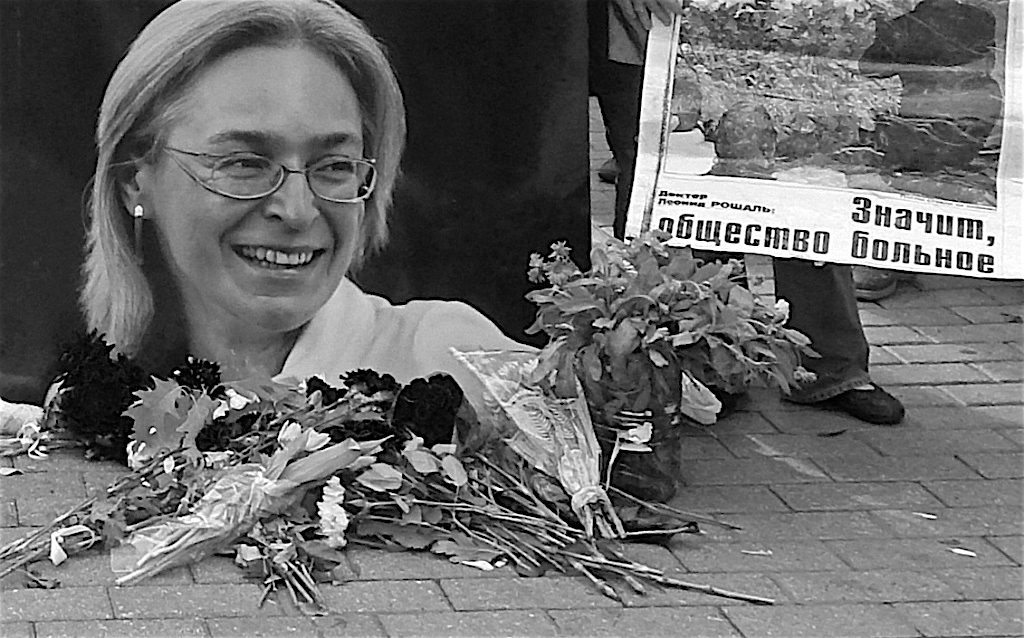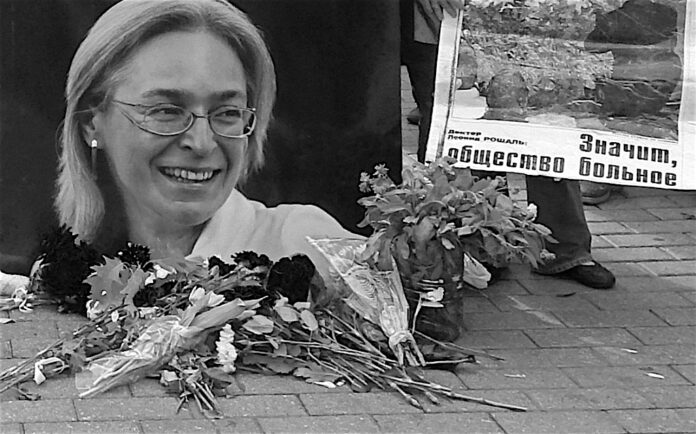With thousands of journalists being tortured and murdered for reporting the news, it would be inhumane for Americans to stand by and do nothing.
Journalists in the United States rarely have to worry about putting their lives at risk, even if they write a piece criticizing a political figure, or investigate corruption or crime. But that isn’t the case for journalists in most other countries. Freedom House, a U.S. government-funded not-for-profit, finds that only 13 percent of the world’s population is able to enjoy a free press. Abroad, many journalists are threatened, jailed, and even murdered just for doing their jobs, of informing the public about the latest news. Russia, Turkey, Egypt, China and Eritrea were among the most dangerous countries for journalists in 2016, according to Reporters without Borders’ World Press Freedom Index. In these countries, journalists are often harassed or incarcerated for reporting the news, or for posting things on social media their governments dislike. In other countries, as among them Somalia, Iraq, Syria, Mexico and the Philippines, journalists are killed with impunity, according to the Committee to Protect Journalists. More than a thousand journalists have been killed since 1992, CPJ says, with most killings related to politics. The killers typically weren’t convicted, or even charged. A lack of justice for journalists in these dangerous countries makes it difficult for journalists to do their jobs without practicing self-censorship. The persecution of journalists remains a major global problem, and as a result, according to Freedom House, in 2016 global media freedom reached a new low.
As human beings, it would not be right for us to stand by and do nothing, as thousands of journalists are tortured and murdered for reporting the news. People have the right to information, and it is a journalist’s job to inform the people of a nation of anything currently happening there. This right should not just be limited to people in a few countries. Even though this is a large problem to fix, there are a few things we can do to improve safety for journalists in other countries.
I believe we should raise awareness of journalists being persecuted; should urge the United Nations to take more action to protect journalists; should make sure there are consequences for those who commit violence against journalists; and should ensure that the United States remains a model of press freedom.

What Americans Can Do
An important step toward projecting journalists abroad is to raise awareness about cases of journalists who are being persecuted for doing their jobs. This is already being undertaken by not-for-profit organizations, such as CPJ in the United States, and Reporters Without Borders in France. CPJ has been creating campaigns and recording reports of violent acts against journalists since 1981, while Reporters Without Borders has been promoting freedom of information and the press since 1985.
Bringing attention to attacks on journalists is important, because it can lead to investigations of cases of journalists murdered with impunity. CPJ recently publicized the case of Naveen Gupta, an Indian journalist shot dead in the Indian state of Uttar Pradesh in November 2017. The motive and killer are still unknown. But CPJ’s reporting and advocacy could help bring arrests. Because of the “Free the Press” campaign it launched in 2017, for example, CPJ was able to secure early release for 67 imprisoned journalists. Among them was Egypt’s Mosad al-Barbary. Without CPJ’s help, he might have been in prison for life.
“People have the right to information, and it is a journalist’s job to inform the people of a nation of anything currently happening there. This right should not just be limited to a few countries.”
Because of its Global Campaign Against Impunity, CPJ was also able to help win convictions in the murders of 35 journalists, the group said. CPJ helped convict an ex-municipal police commander, for the murder of Mexican reporter Marcos Hernández Bautista; and an ISIS militant, for the killing of Naji Jerf, a Syrian editor working in Turkey.
“Murder is the ultimate form of censorship,” the CPJ’s Courtney Radsch told the Huffington Post. “It not only silences the journalists personally, but has a chilling effect on the rest of the press.” CPJ and Reporters Without Borders are the voices for journalists who were silenced. They’ve been able to make progress, and even the smallest progress is a step forward to a more globally free press. Their voices need to be heard, to show that freedom of information and press are important in every country. Supporting these organizations will help them to continue defending the rights of journalists, and will demonstrate to others how large this issue really is.
We Should Back U.N. Initiatives to Protect Journalists
Action must also be taken to ensure the safety of journalists — and here the United Nations can play a major role. Article 19 of the Universal Declaration of Human Rights states: “Everyone has the right to freedom of opinion and expression; this right includes freedom to hold opinions without interference and to seek, receive and impart information and ideas through any media regardless of frontiers.” Many journalists have been jailed, threatened, or murdered just because they were doing their jobs, to provide information to public – a violation of this principle. In response to the numerous attacks on journalists, the United Nations in 2012 created a Plan of Action on the Safety of Journalists and the Issue of Impunity. Sonali Samarasinghe, a former journalist and the widow of a journalist killed in 2009, told the Indian publication The Wire in 2017: “This plan includes a number of actions, including standard-setting, policy-making, monitoring, reporting, building capacity and awareness-raising.” Special days, such as the UN’s International Day to End Impunity for crimes against journalists, on Nov. 2, and the International Press Institute’s International Declaration on the Protection of Journalists, also help raise awareness. IPI is pressing journalists and media outlets to endorse its document. Even though the United Nations has condemned the attacks on journalists, governments of individual countries have not followed suit.
”When it comes to imprisoning journalists, repressive governments are increasingly unresponsive to international pressure,” CPJ executive director Joel Simon said. “That’s partly because the United Nations is not equipped to hold member states accountable, particularly when it comes to human rights violations.”
There also must be consequences for those who commit crimes against journalists. Too few killers face any sort of punishment, a situation that allows even more journalists to be killed. CPJ found that, from 2004 to 2013, 370 journalists were slain as a result of their work, but that assailants were brought to justice in only 41 cases. Convicting those who attack journalists will show that perpetrators can no longer get away with such crimes. Impunity should no longer be tolerated. Radsch says the absence of punishment for those who kill journalists is often the result of weak institutional capacity, and a “lack of political will,” and that the international community could help by making financial contributions to investigations and prosecutions.
“I believe we should raise awareness of journalists being persecuted; should urge the United Nations to take more action to protect journalists; should make sure there are consequences for those who commit violence against journalists; and should ensure that the United States remains a model of press freedom.”
One case that needs a deeper investigation is the murder of Anna Politkovskaya, the Russian journalist known for reporting on human rights abuses by the Russian military in Chechnya.
“Politkovskaya had been threatened and attacked numerous times in retaliation for her work,” according to a report by CPJ, including being poisoned and kept in a pit for three days without food or water. Even though five people were found guilty of carrying out her 2006 murder, the mastermind of the crime is still unknown. Politkovskaya was murdered with partial impunity and, in CPJ’s view, her killing remains unsolved. When there are no consequences for the masterminds of these killings, journalists practice self-censorship, lest their aggressive reporting could cost them their lives. Radsch told the Huffington Post that proper investigations and prosecutions “can also exert pressure on countries to follow through on pledges to protect the press.” Consequences are necessary to show that the lives of journalists matter, and that their job is important.
The Trump Threat
As they work in one of few countries with a free press, it’s important that U.S. media remain free, so it can serve as an international example. But the media environment in the United States has shifted since the 2016 election of President Donald J. Trump.
“A Trump presidency represents a threat to press freedom unknown in modern history,” in CPJ’s view. When Trump claims media outlets are publishing “fake news,” and repeatedly threatens journalists who are accurately reporting the news, it impacts the rest of the world. The United States must model for other countries, because “protection of press freedom in the United States remains vital to the defense and expansion of press freedom worldwide; indeed, it is a cornerstone of global democracy,” Freedom House’s Michael Abramowitz wrote in the organization’s Freedom of the Press report in 2017. Trump’s criticizing of the media encourages leaders in other countries to follow suit, with less fear of the consequences.
Trump wants to censor journalists, as other leaders, such as Vladimir Putin in Russia, Recep Tayyip Edrogan in Turkey, and the presidents of Venezuela, Ecuador and Bolivia do. These leaders “use their power to intimidate independent journalists and make it nearly impossible for them to function,” Simon argues in his 2014 book “The New Censorship: Inside the Global Battle for Media Freedom.” It is important now more than ever for journalists to defend their rights to freedom of expression. Not only would letting Trump curtail those freedoms affect Americans, but it would damage people and press freedom all over the world. If journalists in the United States can defend themselves against Trump’s verbal attacks and threats, that might serve as an example for journalists elsewhere, who may be inspired to defend themselves against their own oppressive leaders.
Without freedom of the press, the government can easily take control of the media, and cover up sensitive topics, so that no one can know what is really happening. This is already happening in countries where the press isn’t free. Reporters Without Borders stated that “journalistic independence is being undermined in both state and privately-owned media as a result of enhanced mechanisms for censorship and news control, propaganda apparatuses, and ideologies—especially religious extremism—that are hostile to journalism.” In China, the government controls the media, and if a journalist writes something the government considers unfavorable, the journalist can be jailed. According to Reporters Without Borders, more than 1,000 journalists in Turkey were prosecuted for insulting the president, and more than 100 journalists were jailed. In Russia, the government controls media news outlets, and journalists are beaten up for trying to investigate and report what is happening in Chechnya.
Journalists shouldn’t be forced to risk their lives, just for reporting on the important issues of the day. There must be consequences for those who kill journalists, to show that impunity will no longer be tolerated. And the United States should continue to stand as a leading example of press freedom.


